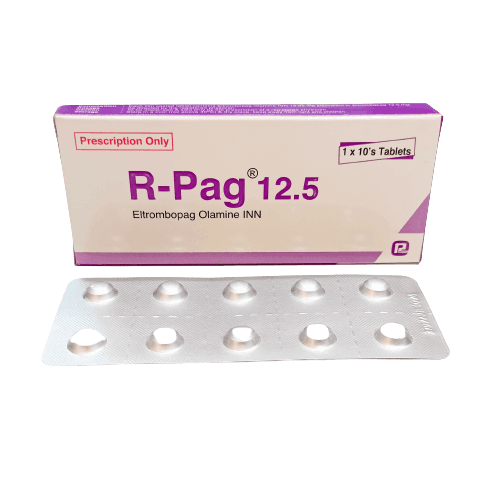
Type:10 Tablets
Generic Name:Eltrombopag Olamine
Manufacturer:Renata Limited
Price:৳2500.00
Adult chronic immune (idiopathic) thrombocytopenic purpura (ITP), Hepatitis C Virus (HCV) related, Thrombocytopenia, Aplastic anemia
Should be taken on an empty stomach: Take at least 4 hr before or after antacids, dairy products or other Ca-containing food products or mineral supplements containing polyvalent cations.
Adult Chronic ITP: Initial dose 50 mg once daily. Adjust to maintain platelet count greater than or equal to 50×109 /L Chronic hepatitis C associated thrombocytopenia: Initial recommended dose is 50 mg once daily and do not exceed a daily dose of 100 mg. Severe aplastic anemia: Initial recommended dose is 50 mg once daily, adjust to maintain platelet count greater or equal 50×109 /L. Do not exceed 150 mg per day Max: 75 mg daily. After adjustment, platelet counts should be monitored at least weekly for 2-3 weeks. Wait for at least 2 weeks to see the effect of any dose adjustment on the patient’s platelet response prior to considering another dose adjustment. Hepatic Impairment: Should not be used in ITP patients with liver cirrhosis (hepatic impairment unless the expected benefit outweighs the identified risk of portal venous thrombosis.
Child 6 years or older Chronic ITP: Initial dose 50 mg once daily. Child 1 to 5 year The initial dose is 25 mg once daily. Adjust to maintain platelet count greater than or equal to 50×109 /L
Renal Impairment: No dose adjustment is necessary in ITP patients with renal impairment.
Eltrombopag is contraindicated in patients with severe hepatic impairment and who are hypersensitive to any of its excipients.
Small-molecule thrombopoietin (TPO)-receptor agonist that interacts with human TPO receptor transmembrane domain of human TPO-receptor & initiates signaling cascades that induce proliferation & differentiation of megakaryocytes from bone marrow progenitor cells.
Regularly monitor clinical haematology, platelet counts & serum liver test throughout therapy. Renal & hepatic impairment; hepatic disease. Thrombotic/thromboembolic complications. Increased risk of bleeding upon discontinuation of treatment. Bone marrow reticulin formation & risk of bone marrow fibrosis. Malignancies & progression of malignancies. Pregnancy & lactation. Childn <18 yr, elderly.
Most common adverse reactions are nausea diarrhea, upper respiratory tract infection, increased ALT, mayalgia, urinanry tract infection, fatigue, headache, Insomnia; headache, paraesthesia; cataract, dry eye; GI & hepatobiliary disorders; rash, pruritus, alopecia; arthralgia, muscle spasm, bone pain; fatigue, peripheral oedema; thromboembolic events.
Pregnancy Available data from published case reports and postmarketing experience with use in pregnant women are insufficient to assess any drug-associated risks for major birth defects, miscarriage, or adverse maternal or fetal outcomes Animal data In animal reproduction and developmental toxicity studies, oral administration of eltrombopag to pregnant rats during organogenesis resulted in embryolethality and reduced fetal weights at maternally toxic doses Effects were observed at doses resulting in exposures that were 6 times the human clinical exposure based on AUC in patients with chronic ITP at 75 mg/day, and 3 times the AUC in patients with chronic hepatitis C at 100 mg/day Contraception Based on animal reproduction studies, fetal harm may occur when administered to a pregnant woman Use effective contraception in sexually-active females of reproductive during treatment and for at least 7 days after stopping treatment Lactation No data available regarding presence of eltrombopag or metabolites in human milk, effects on breastfed child, or on milk production However, drug was detected in pups of lactating rats 10 days postpartum suggesting potential for transfer during lactation; due to potential for serious adverse reactions in a breastfed child from drug, breastfeeding is not recommended during treatment
Increased plasma Cmax & AUC of HMG-CoA reductase inhibitors. Caution w/ methotrexate, topotecan. Increased conc w/ fluvoxamine; decreased conc w/ rifampicin & lopinavir/ritonavir. Reduced absorption by antacids, dairy products & other products containing polyvalent cations (eg Fe, Ca, Mg, Al, Se, Zn). Reduced plasma AUC & Cmax w/ high-calorie & -fat meal. Monitor platelet counts when used in combination w/ lopinavir/ritonavir & other drugs for treatment of idiopathic thrombocytopenic purpura (ITP).